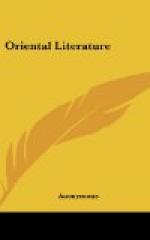He waited till the horse passed close by him, and suddenly showed himself with a shout, and hit the racer violently between the eyes with a stone. The horse reared, stopped one moment, and the rider was on the point of being unseated. Shidoub was a witness to the incident, and having looked at the slave, recognized him as belonging to the treacherous Hadifah. In the violence of his rage he flung himself upon Dames, and struck him dead with his sword: then he approached Dahir for the purpose of speaking soothingly to him, and starting him again on the race; but, alas, the mare Ghabra rushed up like the wind. Then Shidoub, fearing defeat, thinking of the camels he would forfeit, set out running at full speed towards the lake, where he arrived two bow-shots in advance of the horses. Ghabra followed, then Dahir last, bearing on his forehead the mark of the missile; his cheeks were covered with blood and tears.
All the spectators were astounded on seeing the agility and endurance of Shidoub; but as soon as Ghabra had reached the finish the Fazareans uttered loud shouts of joy. Dahir was led home all bleeding, and his rider told the men of the tribe of Abs what the slave had done. Cais examined the wound of his horse and asked for full details of the occurrence. Antar grew crimson with anger, and laid his hand upon his invincible sword, as if impatient to annihilate the tribe of the Fazareans. But the sheiks restrained him, although with difficulty, after which they went to Hadifah to cover him with shame, and to reproach him with the infamous deed he had done. Hadifah denied it, with false oaths, affirming that he knew nothing of the blow dealt to Dahir; then he added, “I demand the camels which are due to me, and I do not admit the treacherous pretext on which they are being withheld.”
“That blow is doubtless of evil augury for the tribe of Fazarah,” said Cais. “God will certainly give us victory and triumph, and destroy them. For Hadifah only desired this race to take place in order that it might cause trouble and discord, and the disturbance which this contest is sure to excite will stir up one tribe against another, so that there will be many men killed, and children made orphans.” The conversation which followed among the tribesmen became more and more excited, confusion followed, shouts rang out on all sides, and drawn swords flashed. Bloodshed would have resulted had not the sheiks and wise men dismounted and with bared heads mingled with the crowd, with humble mien, imploring them, until at last the matter was settled as harmoniously as possible. It was agreed that Shidoub should receive the amount of the wager—a hundred camels from the tribe of Fazarah, and that Hadifah should abandon his claims and refrain from all dispute. Such were the measures taken to extinguish the hostility and disorder which threatened to burst out among the tribes. Then the different families retired to their own dwellings, but the hearts of all were filled




